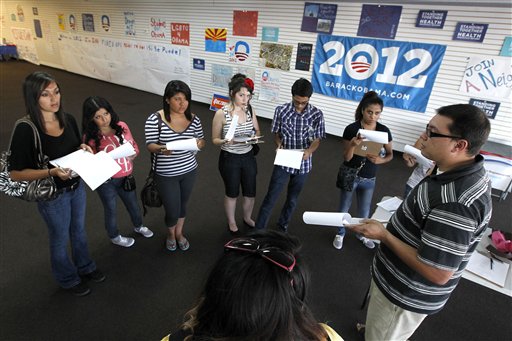It is widely accepted that Hispanics will become a larger share of the American electorate in the years to come.
Videos By Rare
This is a matter of simple arithmetic. Less than one-tenth of adults counted in the 2010 Census classified themselves as “Hispanic” (a term invented by the Census Bureau for the 1970 count).
But one-quarter of children were similarly classified. Many of them the offspring of illegal aliens, were born in the U.S. and thus entitled to citizenship.
It’s true that Hispanics may not be as large a share of voters as is sometimes projected. There has been zero net migration from Mexico to this country since 2007, and, given advances in Mexico, immigration at the 1982-2007 levels may never resume.
In any case, Hispanics are bound to form some larger percentage of the electorate than the 10 percent recorded in the 2012 exit poll, and one that inevitably will be targeted by both parties and many candidates.
Which is why it may be helpful to expose two myths about Hispanic voters advanced by both the political right and the political left over the past few years.
One, advanced hopefully by the right, is that Hispanics are highly religious and family oriented, and as a result are natural cultural conservatives.
The picture these analysts paint looks much like 1950s Irish-American Catholics, regular Mass attenders with large families. But, in fact, Hispanic rates of divorce, unmarried motherhood and single-parent families are significantly higher than among whites (though lower than among blacks).
Latin Catholicism has traditionally been more lenient on mores than traditional Irish-influenced American Catholicism; the Catholic Church has not survived for nearly 2,000 years without adapting to local terrain.
Recent polling shows that Hispanics are as accepting of same-sex marriage as most Americans and that opposition to abortion among Hispanics is higher than average only among immigrants and not among their children and grandchildren.
“Family value” themes may resonate among the one-sixth of Hispanics who are evangelical Protestants, but not so much among others.
A second myth about Hispanic voters, advanced by many on the left, but also ruefully by some on the right, is that they are big government liberals.
This finds backing in surveys where Hispanics are more likely than average to say that they favor a bigger government providing more services and less likely to favor a smaller government providing fewer services.
In the 2012 campaign, this translated into support for Obamacare. Obama campaign strategists noted that the law was unpopular among voters generally, but evoked very positive responses from Hispanics.
So the Obama campaign, generally mum on Obamacare in English, ran Obamacare spots in Spanish-language media.
The numbers seem to look different now. Since the Obamacare rollout, Gallup’s numbers show that the president’s job approval has declined more among Hispanics — 23 percent — than among any other demographic group.
If Hispanics had difficulty, like everyone else, in using the English-language Obamacare website, they had even more difficulty with the Spanish-language version, which wasn’t operative at all for weeks.
Hispanics with roots in societies where government is crony-ridden and corrupt may have expected government that would be trustworthy and efficient in the United States. Hey, who doesn’t want free stuff from such a government?
But practice proved different. The Obamacare rollout — just like the government programs that encouraged home mortgages for not necessarily creditworthy Hispanics — has not produced the favorable results they may have expected.
By my estimate, about one-third of the homeowners foreclosed on in the years just after the housing price collapse were Hispanics. Their dreams of accumulating wealth through ever-rising house prices were shattered.
And the dreams of getting subsidized health insurance through a website just as efficient as Amazon.com seem to be getting shattered too. Government in the United States is beginning to look as unreliable as government has traditionally been south of the border.
People tend to form their political attitudes over the years as they experience how political parties’ policies work out in practice. People who have been voting for many years tend to have fixed attitudes because they already have plenty of experience, and one new episode doesn’t usually make much difference.
Most Hispanic voters, in contrast, don’t have years of experience voting in the United States. They may be more susceptible to revising their attitudes in light of recent events.
Which is to say, the Hispanic vote is up for grabs.
© THE WASHINGTON EXAMINER
DISTRIBUTED BY CREATORS.COM

